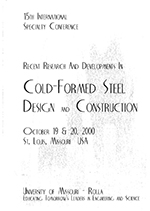Session Dates
19 Oct 2000
Abstract
This paper presents an analytical thermal-structural model for loadbearing lightweight steel framed (LSF) walls exposed to fire on one side. The model reflects temperature and deformation data from six standard fire resistance tests conducted recently by the National Research Council of Canada in partnership with the North American steel industry. Some characteristic patterns in thermal transmission and structural behaviour are discussed. Temperature histories across LSF assemblies are simulated numerically by explicit integration of transient heat transfer equations. The apparent thermal properties are calibrated for gypsum board and three types of insulation. Analytical procedures are presented to simulate lateral deformation histories and predict structural failure times. The model illustrates how different heating regimes in cold formed steel studs cause different structural failure modes.
Department(s)
Civil, Architectural and Environmental Engineering
Research Center/Lab(s)
Wei-Wen Yu Center for Cold-Formed Steel Structures
Meeting Name
15th International Specialty Conference on Cold-Formed Steel Structures
Publisher
University of Missouri--Rolla
Document Version
Final Version
Rights
© 2000 University of Missouri--Rolla, All rights reserved.
Document Type
Article - Conference proceedings
File Type
text
Language
English
Recommended Citation
Alfawakhiri, Farid and Sultan, Mohamed A., "Fire Resistance of Loadbearing LSF Assemblies" (2000). CCFSS Proceedings of International Specialty Conference on Cold-Formed Steel Structures (1971 - 2018). 1.
https://scholarsmine.mst.edu/isccss/15iccfss/15iccfss-session9/1
Fire Resistance of Loadbearing LSF Assemblies
This paper presents an analytical thermal-structural model for loadbearing lightweight steel framed (LSF) walls exposed to fire on one side. The model reflects temperature and deformation data from six standard fire resistance tests conducted recently by the National Research Council of Canada in partnership with the North American steel industry. Some characteristic patterns in thermal transmission and structural behaviour are discussed. Temperature histories across LSF assemblies are simulated numerically by explicit integration of transient heat transfer equations. The apparent thermal properties are calibrated for gypsum board and three types of insulation. Analytical procedures are presented to simulate lateral deformation histories and predict structural failure times. The model illustrates how different heating regimes in cold formed steel studs cause different structural failure modes.



